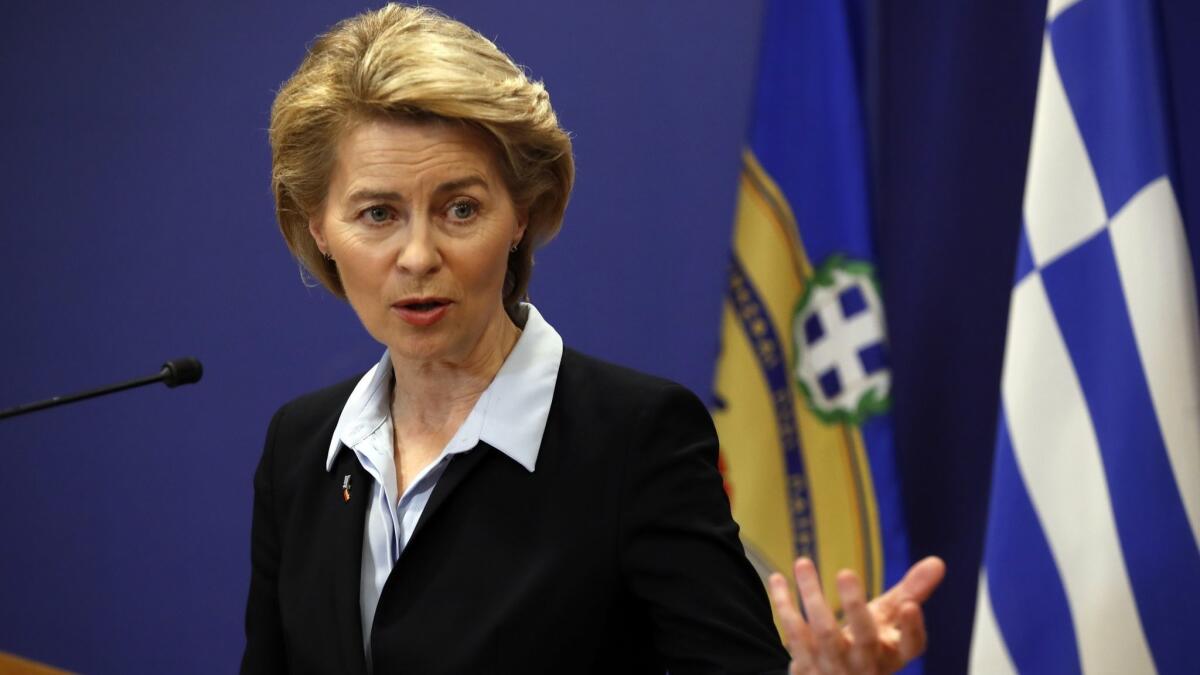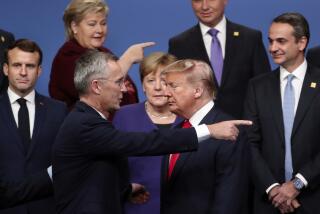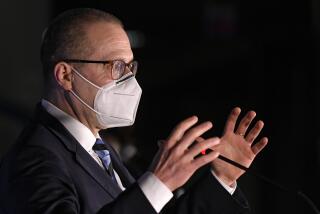Trump travel directive opens new rift with Europe as its leaders blast lack of notice

President Trump’s surprise order banning travel to the United States from much of Europe hammered financial markets on both sides of the Atlantic on Thursday, opened a stark new rift with European allies and drew accusations that he was fanning xenophobia rather than engaging in a serious effort to stem the spread of the coronavirus.
European leaders expressed indignation and bafflement over the sweeping restrictions, saying they were not consulted in advance about a directive likely to carry broad economic repercussions. They also chafed at Trump’s suggestion that inadequate containment efforts in Europe allowed travelers to “seed” a U.S. outbreak.
In an Oval Office address Wednesday night, the U.S. leader announced that all travel and movement of cargo into the United States from Europe, except from Britain, would be halted — though that statement was quickly walked back.
U.S. officials said the restrictions would apply to people, not goods — and not to U.S. citizens and their immediate family members. The directive covers most foreign citizens who had been in Europe’s passport-free travel zone — the so-called Schengen area — at any point in the 14 days before seeking to travel to the United States.
Even in its diluted form, the order appeared to be another instance of Trump catching allies unawares with a major policy decision, and markets plunged anew in Europe and the United States, intensifying fears of a global recession linked to the outbreak.
“The European Union disapproves of the fact that the U.S. decision to impose a travel ban was taken unilaterally and without consultation,” European Council President Charles Michel and European Commission President Ursula von der Leyen said in a joint statement.
The leaders called the spread of the coronavirus “a global crisis, not limited to any continent,” saying it “requires cooperation rather than unilateral action.” And they took exception to Trump’s characterization of a lax European response, saying the EU is “taking strong action to limit the spread of the virus.”
Some former diplomats and analysts suggested that the president’s announcement was an attempt to blame outsiders rather than explaining how the U.S administration intended to combat the threat.
“Trump needed a narrative to exonerate his administration from any responsibility in the crisis,” Gerard Araud, a former French ambassador to the United States, wrote on Twitter. “The foreigner is always a good scapegoat.”
Some prominent Europe watchers said Trump, who frequently denigrates the European Union, appeared to be once again taking aim at the bloc, although the countries subject to restrictions do not precisely overlap with EU membership.
“This is not about containment, this is about sending a political message,” Benjamin Haddad, director of the Future Europe Initiative at the Atlantic Council, wrote on Twitter. “In a time when the EU is challenged to its core, the U.S. is closing its borders and turning its back on allies.”
Particularly in the initial confusion that followed Trump’s address, travelers were distressed. Jake Ranieri and Tessa Reed, both 20-year-old University of Iowa students, were heading home after their exchange program in San Sebastian, Spain, was canceled.
Then, in the middle of their night in Europe, came word of Trump’s travel restrictions. Reed was asleep, but awoke to “60 missed calls,” which she called “the scariest thing to wake up to.”
The two managed to get tickets out and had only an hour to say goodbye to their host families. Waiting in line at the airport in nearby Bilbao, both wore face masks.
“My eyes are puffy,” said Reed. ”I’ve been crying all morning.”
Even some of the president’s former aides have been publicly critical of his move, calling it a distraction and a misdirection of resources.
“There’s little value to European travel restrictions,” Trump’s former homeland security advisor Tom Bossert wrote on Twitter, calling the White House-announced measures “poor use of time & energy.”
Like others, Bossert said such measures might have had an impact early in what the World Health Organization has now designated a pandemic, but will have limited effect nowbecause the virus is already spreading within the United States.
Trump’s stance won praise, however, from the head of the Centers for Disease Control and Prevention, Robert Redfield. He called Europe “the new China,” a reference to the novel virus’ origins.
Although several European countries fall outside the travel measures, Trump specifically stressed that the restrictions would not include Britain, which has formally withdrawn from the EU but remains subject to its rules and procedures during a transition period this year.
Trump has been an enthusiastic backer of Brexit, Britain’s exit from the bloc. He is also an ally of Prime Minister Boris Johnson, although the president’s unpopularity in Britain sometimes causes the British leader to seek distance from Trump’s pronouncements.
Speaking to reporters on Thursday at the White House, Trump said Britain deserved special stature because of its “very strong borders” and cited what he called its low rate of infection.
But British officials have reported a jump in new cases and an uptick in deaths. Johnson on Thursday called the coronavirus “the worst public health crisis for a generation” and warned compatriots that “many more families are going to lose loved ones before their time.”
Alexander Stubb, the former prime minister of Finland, called the carve-out for the United Kingdom — which has more cases than many of the countries targeted — “nothing short of irresponsible.”
“Decisions should be based on facts, not politics,” he wrote on Twitter.
After Trump’s drawing of a sharp distinction between Britain and other European nations, commentators quickly pointed to the fact that Trump owns three golf resorts in Britain and in Ireland, which is also exempt because it lies outside the Schengen area.
Johnson’s government avoided direct criticism of Trump, but senior officials sent out to talk to the media seemingly could not bring themselves to praise the restrictions. The chancellor of the exchequer, Rishi Sunak, said in a BBC radio interview that the British government was “always guided by the science as we make our decisions here.”
“There isn’t evidence that interventions like closing borders or travel bans are going to have a material effect on the spread of the infection,” he said. Many experts instead have called for steps to slow community transmission, including bans on large gatherings.
Some commentators suggested that Trump’s favoring of the United Kingdom, seemingly meant as a boon to Johnson, could in fact heighten Britain’s infection risk by turning it into a prime route for travel to the United States.
“Ironically, the announcement represents a headache for the UK as its transport officials try to work out whether it will become a transit hub for Europeans seeking to reach the US,” wrote Patrick Wintour, diplomatic editor of Britain’s Guardian newspaper.
The Schengen area, to which the U.S. restrictions apply, is made up of 26 countries including EU members France, Italy, German, Greece, Austria and Belgium, where the bloc has its headquarters. But it also encompasses some non-EU countries including Switzerland, Norway and Iceland.
The Trump administration, echoing a pattern throughout the evolving crisis, denied that misleading or contradictory statements from the president had made matters worse. “I don’t think there was confusion” about the travel restrictions, Vice President Mike Pence told CNN on Thursday.
Trump, in his address, said “all travel from Europe” to the United States would be banned for a 30-day period beginning Friday, except by Americans who had undergone “appropriate screenings” and those traveling from Britain.
Homeland Security official Ken Cuccinelli said after Trump’s address that the restrictions do not apply to “American citizens or legal permanent residents or their families.”
Bruno Bonnell, a member of the French parliament and a businessman, blasted the Trump decision as illogical.
“If the situation was not that bad, I would consider it as almost a joke,” Bonnell said. In an interview on the BBC’s “Today,” he also pointed out that with exit and entry points in Britain or elsewhere, anyone wanting to could simply make use of those.
“If I want to go to the U.S. tomorrow, what should I do?” he said. “I’m going to take a train or flight to the United Kingdom, and then take a flight to New York.”
Special correspondent Boyle reported from London and staff writer King from Washington. Special correspondent Meg Bernhard in Bilbao contributed to this report.
More to Read
Start your day right
Sign up for Essential California for news, features and recommendations from the L.A. Times and beyond in your inbox six days a week.
You may occasionally receive promotional content from the Los Angeles Times.






